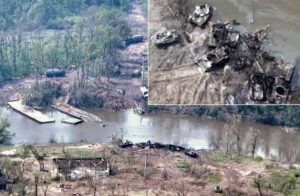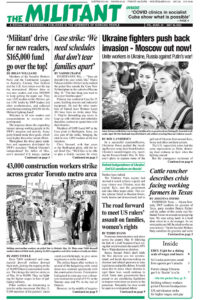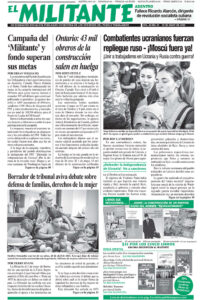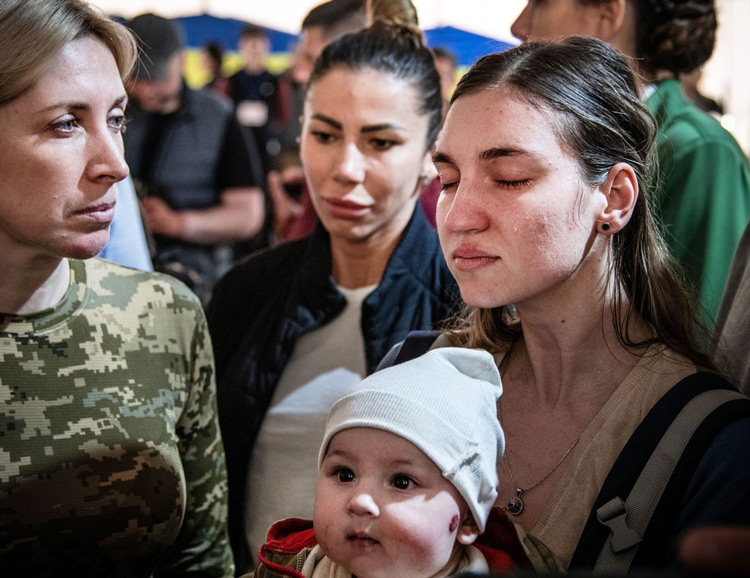In a successful counteroffensive, Ukrainian forces pushed the invading Russian army back from Kharkiv, Ukraine’s second-largest city, reaching the Russian border May 16. Moscow’s plans to capture more of the Donbas have stalled.
The Vladimir Putin regime had insisted it would achieve a quick and easy victory over Ukraine, seize the capital, Kyiv, oust the government and take other major cities. This entire scheme failed as Russian forces, badly beaten and demoralized, had to pull out of Ukraine from around Kyiv, Sumy and other northern centers.
The U.S. imperialist rulers had the same expectations as Putin, shuttering their embassy in Kyiv when the fighting started.
But the courageous resistance of working people in Ukraine has turned these expectations on their head.

Moscow’s war has accelerated the breakdown of the imperialist “world order” that came out of Washington’s victory as top dog in the second imperialist world war. Today there is growing world disorder, as each major capitalist power seeks a road to defend its own national interests first and foremost. Rulers from Sweden to Germany to Australia have announced plans to beef up their military. The threat of new wars grows.
Under a deal between Kyiv and Moscow, close to 1,000 Ukrainian troops and volunteers, some wounded, surrendered to Russian forces and were evacuated by May 18 from the Azovstal steel works in Mariupol. They’ve been sent to Russian-held towns in Donetsk and are supposed to be exchanged for Russian prisoners of war.
They’re being held and interrogated as part of a probe by Moscow into alleged “Ukrainian regime crimes.” The Azovstal fighters have often been smeared by the Russian government as Russian-hating “neo-Nazis.”
Civilians, including many relatives of workers at the steel mill who escaped from the plant to Ukrainian-controlled Zaporizhzhia, said these soldiers were responsible for saving their lives.
The Ukraine government told the fighters holding out in Azovstal’s tunnels to lay down their arms. Their resistance tied down Russian forces for almost three months.
Moscow’s most significant gains have come in Ukraine’s south, where they now occupy territory from Kherson to Enerhodar to Mariupol, connecting the “People’s Republics” of the Donbas with Russian-occupied Crimea.
Putin denies Ukraine is a separate country and claims the right to subjugate the Ukrainian people. Like other oppressed nations incarcerated in the czarist prison house of nations, Ukraine established independence in the 1920s after the Bolshevik Revolution, when its native culture and language flourished. But it was once again reduced to servitude as part of the counterrevolution led by Joseph Stalin. It won independence again following the disintegration of Stalinist regimes in the former Soviet Union in 1991.
Working people in Ukraine joined the popular 2014 Maidan uprising that overturned the brutal pro-Moscow regime of Viktor Yanukovych. That rebellion deepened the confidence of millions that they could defend their country’s sovereignty against Moscow.
“The desire to defend one’s motherland … really does exist and they intend to fight to the last,” Mikhail Khodaryonok, a retired Russian colonel said on the widely viewed “60 Minutes” Russian talk show May 16. The situation “will get worse” for Moscow, he warned, “practically the whole world is against us.”
State media has mostly repeated the Putin regime’s rationalizations for its murderous onslaught. The fact that views like Khodaryonok’s are now openly expressed reflects deepening opposition toward the regime over its conduct of the war.
This was underlined by failed river crossings by Russian forces in the Donbas, timed around Putin’s May 9 Victory Day celebration in Moscow. They planned to cut off Severodonetsk, the easternmost town held by Ukrainian forces.
But Ukrainian artillery fire destroyed them. Hundreds of Russian troops were killed and more than 70 tanks and other armored vehicles destroyed.
In response to the series of Russian setbacks, Putin purged top commanders of the army and navy. He yanked Moscow’s FSB intelligence service out of Ukraine, replacing it with military intelligence.
Impact of war in Ukraine, Russia
Moscow’s brutal war has almost halved the size of Ukraine’s economy. Its naval blockade of Black Sea ports has prevented Ukrainian imports of fuel and exports of grain. Its bombardment across the country has targeted rail connections, fuel storages, grain silos and other vital infrastructure.
A wing of the U.S. rulers is now urging Washington to pressure Kyiv to shelve plans for further advances and reach a peace deal with Putin on terms that allow him to “save face.” Their view of what’s best for U.S. imperialism — including future collaboration with Moscow against Beijing — comes before Ukraine sovereignty.
Due to sanctions by Washington and other imperialist powers, the Russian economy has already contracted sharply, with working people getting hit hardest.
Workers in Russia are finding ways to resist the impact of the crisis deepened by Putin’s war and U.S. sanctions. At the Hemont construction complex in Nizhnekamsk, in Russia’s Tatarstan region, owned by Turkish capitalists, workers walked out March 5. Hundreds of workers, who are flown in from Turkey, marched off the job after their wages were reduced following the sharp collapse of the ruble under the impact of Washington’s sanctions.
The strikers demanded the cuts to their salaries be reversed. The strike ended after bosses agreed to pay them at a higher rate.
Some Russians are offering solidarity to Ukrainians living in Russia or in Moscow-occupied territories in Ukraine. Risking interrogation or arrest, Russian volunteers have formed networks to help thousands of Ukrainians get out of Russia. They help with money, transport, putting Ukrainians up in their homes and providing visa advice.
“It’s a miracle we got out,” Bogdan Goncharov, a former builder in Mariupol, told Reuters. He, his wife and 7-year-old daughter managed to escape “thanks to the volunteers.”
In the long run, this is the key to defeating Moscow’s intervention — the solidarity of working people in Ukraine and Russia.


